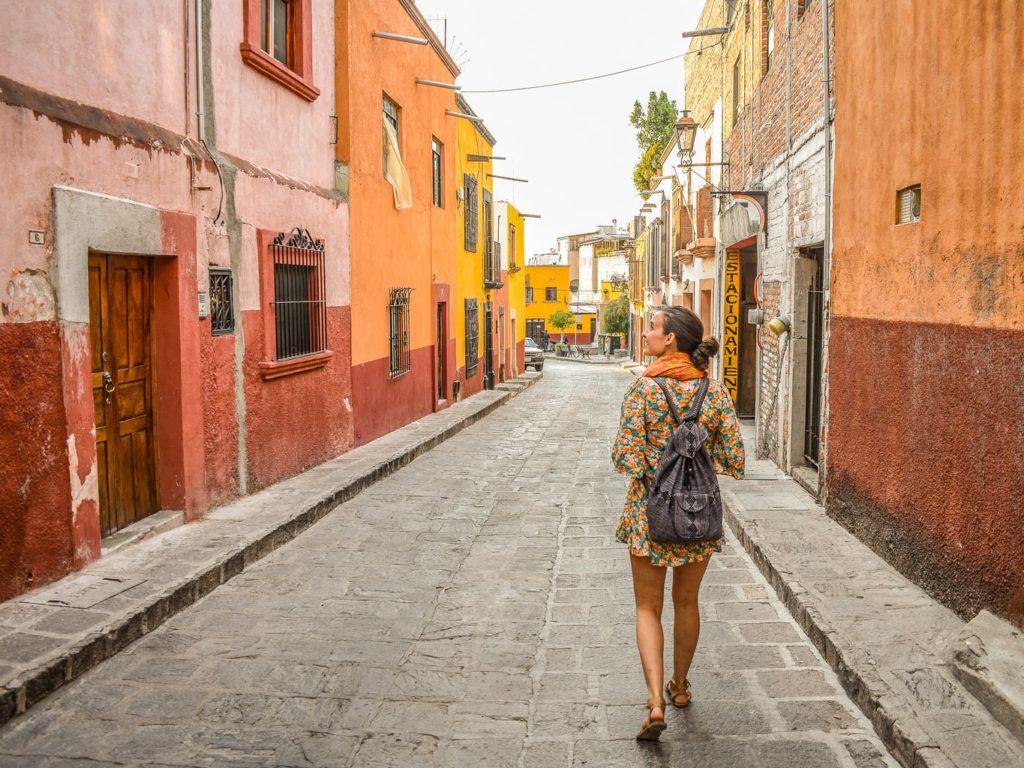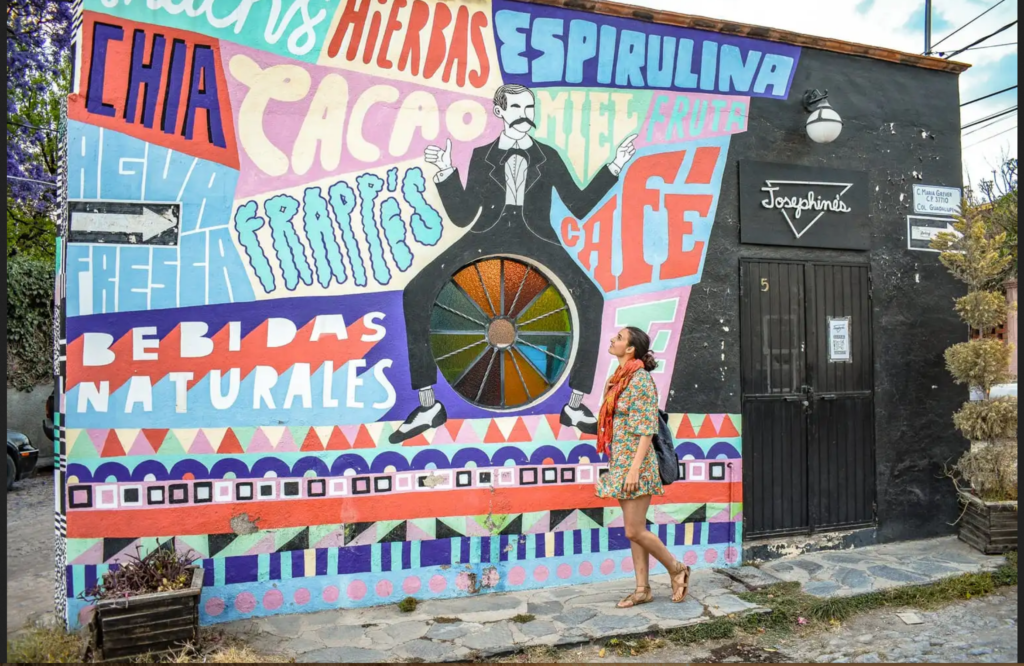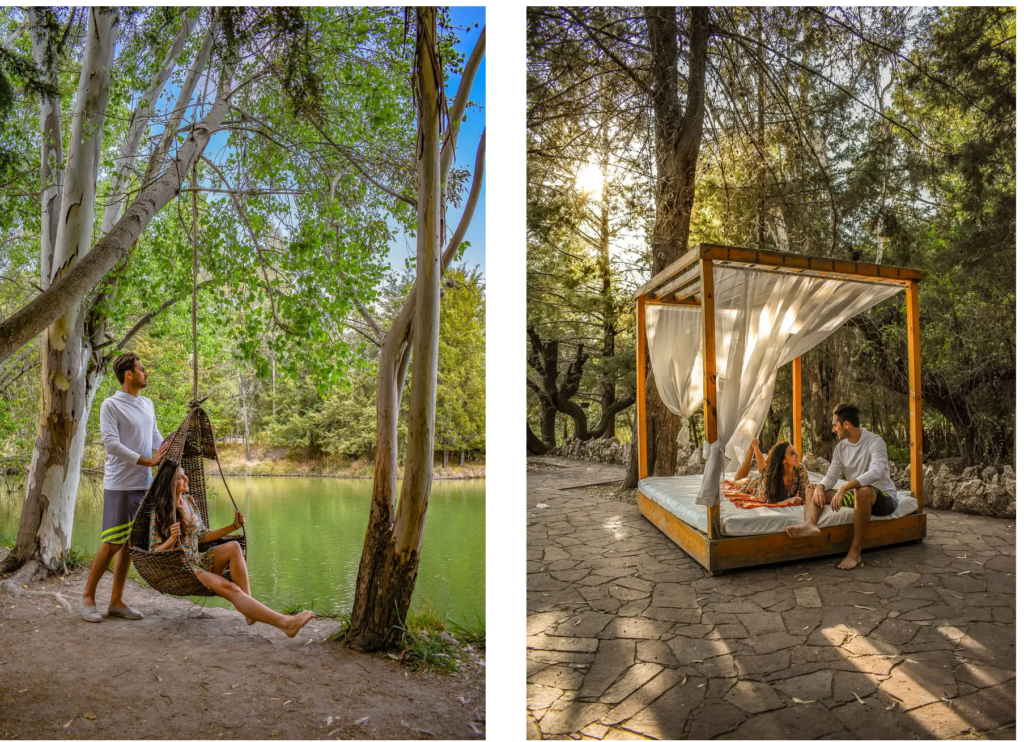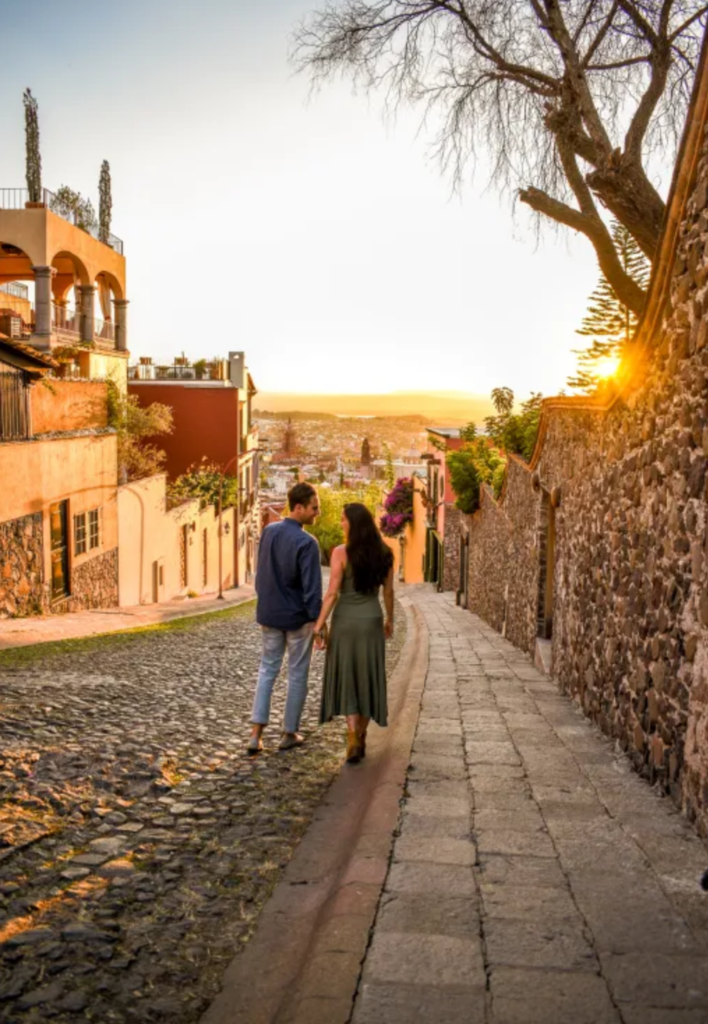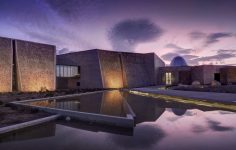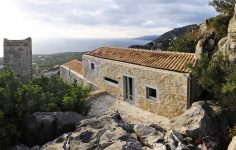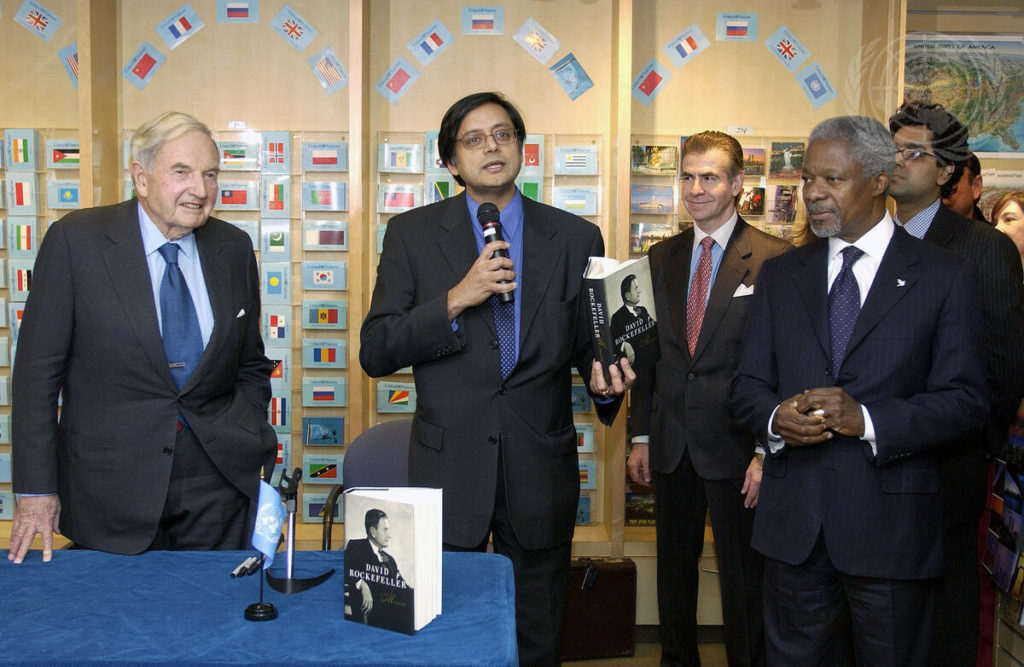Millions of Americans, Canadians, and Europeans visit Mexico every year.
But the vast majority head to the coasts, to vacation hot spots full of resorts and bustling beach towns like Cancún, Puerto Vallarta, and Cabo San Lucas.
But Mexico is a large country, about one-fifth the size of the U.S., and has a lot more to offer than margaritas under a beach umbrella.
One of the country’s hidden charms can be found in its interior, about four-hour’s drive northwest of the capital, Mexico City. The town is called San Miguel de Allende, and it’s located in the Colonial Highlands region. It offers a lot of benefits: temperate climate, low cost of living, an active expat community, welcoming locals, charming local cultural traditions, and a focus on the arts.
The setting is beautiful. Its colonial centro is a UNESCO World Heritage site. So it is mandated that homes, churches, civic structures, businesses…just about every original structure…retain its historic, original appearance. And that is strictly-enforced here. Even signage for businesses is discrete. Narrow streets, cobblestone or flagstone, are lined with homes in shades of yellow, red, orange, and brown terracotta, barrel-tile roofs. It might be tough to drive a car here, but it’s certainly a pleasant place to take a long walk, exploring the architectural splendor that includes grand homes with wrought iron bars and imposing wooden doors, baroque churches with carved archways depicting religious scenes, and more.


OLYMPUS DIGITAL CAMERA
Thanks to its beauty and peaceful atmosphere, along with all the other benefits, San Miguel is certainly no stranger to expats—they make up about 10% of the 140,000 residents in the wider metro area. These days the population swells during the North American winter, when Canadian, American, and European “snowbirds” flock to town for the great climate.
Retire in San Miguel de Allende

As you turn a corner you’ll more often than not come into plazas and parks filled with shady trees and benches. These are hives of activity with food vendors, couples strolling hand in hand, playing children, and chatting retirees. There is guaranteed to be at least one shoe shine stand.
Behind plain doorways and windows with wrought-iron bars are hidden treasures. Colonial homes are historic inside and out, although the renovated ones have updated electric and plumbing, as well as high-speed internet. Interior courtyards with gardens and fountains, intricate decorative tile work, vaulted ceilings with the original timbers…you’re living in history.
Because it’s in the high sierra, the air is crisp and clean. And the climate is temperate year-round, staying in the 70s F most days and cooling down at night to the 50s F. Only in January and February will you experience colder months, with comfortable days and dips close to freezing on the coldest nights.
There is also high quality and low cost medical care available. Well-regarded doctors, dentists, and medical clinics are located in town, with large hospitals and specialists available in the nearby city of Queretaro, about 45-minutes’ drive away.
The epicenter of life for expats and locals is El Jardin, the main plaza and park in front of the famous red gothic style church known as La Parroquia. In the colonnaded buildings surrounding the park are cafés and restaurants where you can enjoy a café con leche (coffee with milk) and people watching.


What calls so many expats to San Miguel in particular? The same reasons that the town’s first foreign residents came right after World War II. They were veterans who came to take art classes in local institutes—it was covered by the GI Bill. Since then it’s been a favorite destination of artists, musicians, and others interested in art and culture.
Today it has a thriving arts scene with live theater, lectures, book clubs, live music performances, foreign and independent films theaters…and more galleries showcasing modern and folkloric art than you can count. Whether you’re a participant or spectator, it’s a great scene for art lovers.
There are also great restaurants. The influence of tourism and the relatively large expat population means you can find everything from street tacos for about 75 cents and simple meals in local restaurants for a couple of bucks, to cuisine from around the world, including Italian, sushi, vegetarian, as well as gourmet options
Cost of Living in San Miguel de Allende

The low cost of living carries over to daily expenses and monthly bills as well. Rents start at about $500 per month for a two-bedroom apartment for a long-term lease. This will put you on the outskirts of the historic centro. Keep in mind that during “high season,” from January to April, it is very hard to find a monthly rental and prices do go up. If you’re interested in living in the city at that time of year, it’s best to reserve a place early.
Local markets offer fresh produce in a lively atmosphere at a low price. A retired couple could fill their fridge with fruits and veggies, plus meat and chicken, eggs…whatever they want, for about $25 a week. With the pleasant climate, there’s no need for air conditioning or heat, so electric bills are low.
Going out is cheap too. Even at “high end” restaurants you won’t break the bank. It’s hard to spend more than $40 to $50 per couple for a nice meal with wine and pre-dinner cocktails.
Here’s an example of a monthly budget for a couple living in San Miguel de Allende:
| Expense | U.S. $ |
| Rent (two-bedroom apartment) | $800 |
| Electricity | $50 |
| Gas & Water | $30 |
| Cell Phones (x2) | $40 |
| Groceries & Household Items | $300 |
| Mercado | $70 |
| Insurance | $100 |
| Internet | $60 |
| Streaming Media Accounts | $45 |
| Property Tax | $22 |
| Dining Out | $100 |
| Taxis, Buses | $40 |
| Monthly total: | $1,657 |
Real Estate in San Miguel de Allende
There are plenty of affordable real estate options in San Miguel de Allende. But the closer you are to the heart of the colonial centro, the plaza known as El Jardin, the higher the price. Expect to pay about $350,000 and up for a restored colonial home, with two or three bedrooms, in the best neighborhoods in town.
But go to the outskirts of the colonial zone, still in safe and nice areas, and you’ll pay much less. For example, a one-bedroom apartment will go for $169,000. From there it’ll still be a five to 10-minute walk to the restaurants and entertainment options and cultural activities in the historic area. Head to the outskirts of town, but still a 20-minute walk to downtown or a five-minute taxi ride (for $3), and you’ll find modern homes for bargain prices. Here you’ll easily find a three-bedroom home for around $200,000 and up.
Is It Safe in San Miguel de Allende, Mexico?

Personal safety should be a primary concern for anybody interested in traveling or living abroad. Mexico, with its unsavory reputation in the American press, may seem an unlikely destination. Yet, with more than 1 million Americans and more than a half-million Canadians living full- or part-time in Mexico, and the vast majority not being victimized by crime, the country is quite safe. The way I always put it, neither I nor my fellow expats in Mexico would be here if we felt unsafe… or felt our families were in danger. That doesn’t mean there is no crime. Just that it is not at the level depicted on the U.S. news all over the country. There are hot spots to be avoided to be sure but also mostly safe areas.
San Miguel de Allende in particular is a secure community, a haven for expats with foreigners making up about 10% of the population of 140,000. As with anywhere, there are certain isolated neighborhoods you don’t want to be wandering around late at night. But in the historic centro, the main tourist area, you can go freely between its plazas, restaurants, bars, shops, and more any time. Just don’t flash jewelry or a lot of cash. Be aware of your surroundings. Use only marked taxis or Uber. Common sense stuff. Watch out for being shortchanged at some restaurants, gas stations, and small shops.
San Miguel de Allende has been named the best city in the world by various travel publications. And with its vibrant arts scene, live music every night of the week, traditional culture, gourmet food, almost always perfect climate, and Spanish colonial surroundings, it has been attracting tourists and expats for many decades.
Crime in San Miguel de Allende
What those who live in San Miguel are most concerned with and take precautions against is petty crime. Car and home break-ins. Robberies. Vandalism. Pickpockets. And the like. You just need to be aware of who you let in your home and always secure it with a locked door or gate. And keep your vehicle in a safe area, leaving no valuables inside. An alarm system helps too. Violent crime does occur but mostly in far-out neighborhoods and isolated nearby villages and mostly involving the drug trade.
Safety Travelling Outside San Miguel de Allende
However, you can safely travel outside of San Miguel de Allende to surrounding attractions, including the hot springs resorts about 20 minutes outside of town. Other good day (or overnight) trips include the state capital, and fellow UNESCO World Heritage site, Guanajuato, about an hour and a half drive (or first-class bus ride) away. Its historic centro is set inside a narrow valley, with views of the homes rising up the hillside painted in a rainbow of colors. Mineral de Pozos is an old mine that is today somewhat of a ghost town. Wherever you go it’s best not to drive at night, mostly because it’s so dark and the mountain roads are very curvy and unlit.
All in all, San Miguel de Allende is a safe location for expats of all ages, including plenty of single women who live alone. The opportunity to thrive in this vibrant community where there’s always something going on and live without fear is a huge benefit to living here.
12 Amazing Things to Do in San Miguel de Allende, Mexico

San Miguel de Allende, in the Colonial Highlands region about four hours north of Mexico City, is a historic city of 140,000 blessed with a temperate climate, good value real estate (to rent and buy), low cost of living, modern amenities and conveniences, lively arts scene, vibrant traditional culture, varied food scene, and many, many more benefits.
It’s no wonder that in 2017 and 2018, San Miguel was voted the best city in the world by the readers of Travel & Leisure magazine, before slipping to second place in 2019. In 2020, Conde Nast Traveler named it the best small city in the world.
Of course, San Miguel has been on the map a lot longer than that. It was first discovered by expats right after World War II. Veterans discovered they could use the GI Bill to study art and Spanish at the local Instituto Allende and other educational centers. It drew a bohemian crowd in search of good weather and low costs. And the city attracts that sort of person to live to this day, as well as a tremendous amount of tourists from around the world. It truly is an international destination with no shortage of things to do, whether you come to live full time or are just visiting.
1. Visit the Mercados and the Weekly Tianguis

You’ll find plenty of supermarkets in San Miguel de Allende. But it’s a lot more fun – and you get more for your money – when you visit the mercados (indoor food markets) sprinkled throughout the city, as well as the Tuesday outdoor farmers’ market and bazaar on the outskirts of town, called a tianguis.
Here you can fill your fridge with enough fruits and vegetables of every variety, eggs, cheese, fish, chicken, and more to last you a week for about $30 for a couple. Plus, you can get a fruit smoothie, a torta (sandwich), or taco at one of the numerous food stalls—the perfect lunch or snack.
At these markets you can also buy clothing, pet food, shoes, flowers (a dozen roses for $3), electronics, tools…plus, it’s just fun people watching, with vendors calling out their deals and enticing you with free samples.
There are two markets worth checking out: Mercado Ignacio Ramírez in the middle of centro and Mercado San Juan de Dios, on the edge of centro near the San Rafael neighborhood.
2. Visit the Craft Market
What would a visit to Mexico be without buying some of its famed arts and crafts. There are 78 indigenous groups throughout Mexico, each with their own unique artforms. Many of their wares on a display in the Mercado de Artesania, the Artisan Market, in centro. Start your journey in the Mercado Ignacio Ramírez (see above) and head to the back right corner. That’s where the long, snaking, narrow corridor lined with stalls and small shops starts. You’ll find leather work, silversmiths, jewelry, fabrics, clothing, paintings, sculpture, glasswork (margarita glasses are popular), and more made by local artisans, as well as those visiting from through the country.
A personal favorite at the thread paintings and beadwork of the Huichol people in the states of Nayarit and Jalisco. Beads cover animal skulls, bowls, and more, each tiny bead placed into the wax by hand to depict creation myths and other folkloric scenes.
Note: Don’t haggle unless the vendor is ready to deal. I always pay artisans who are selling arts and crafts they created themselves directly full price because I think they deserve it—and it’s still so much cheaper than what you would pay in the States.
3. Get Street Food

One of the first pieces of advice people often receive when telling friends and family they’re visiting Mexico, after don’t drink the water (which is quite valid) is… don’t eat street food. Well, when you see a line of 20 people eagerly awaiting tacos from a street stall every night of the week, you have to figure it’s probably safe. They wouldn’t be so popular if they weren’t.
You’ll find taco stands and other street food stalls throughout San Miguel de Allende. Some open for the lunchtime crowd, others roast whole chickens during the day and then switch over to tacos, tortas, quesadillas, gorditas in the late afternoon/early evening…others cater to the late-night party crowd.
Some can’t-miss items include:
Tacos al pastor, which is marinated pork, spit-roasted, then served on a corn tortilla with chopped onion and cilantro and spicy salsa, and elote, which is corn on the cob, grilled, slathered with mayonnaise, then sprinkled with chili powder and cotija cheese.
4. Go on a Wine Tasting
The area around San Miguel and in the wider region is one of Mexico’s premier wine countries. Vineyards can be found on the roads leading to town, as well as near urban centers like Querétaro, about 45 minutes’ drive away. Most vineyards have tasting rooms, as well as gourmet restaurants set in landscaped surroundings, with views of the arid, mountainous landscape.
Check out Viñedo Dos Búhos, which offers hour-long wine tastings for $23 to $37, and is located on the road to Querétaro.
5. Visit Fábrica La Aurora and Then See the Colonia Guadalupe Murals

There are no shortage of art galleries, museums, and other visual art spaces around San Miguel. But a must-visit is Fábrica La Aurora, a former textile factory turned exhibition space. It’s filled with dozens of small artist galleries, artisan shops, cafes and restaurants, antique decor and modern furniture stores, jewelry boutiques, and more. It’s a mix of local and expat artists, with a good selection of fine art. Whether you’re decorating your new home in town or looking for a souvenir, you’ll no doubt find something that calls to you at Fábrica. Before you head out be sure to nab an outdoor table under a shade tree and a cappuccino at Geek & Coffee.

While you’re in the colonia (neighborhood), called Guadalupe, be sure to stroll through a couple of blocks to see the parade of murals put up on the walls of homes and business by talented local artists. You’ll find this “street art” all over the area.
6. Go to the Hot Springs
Outside of San Miguel are several low-key natural hot springs resorts that cater to day-trippers eager for a hot soak. One of the most popular is La Gruta (The Grotto), so named for a mad-made stone cave that concentrates the heated water into a large sauna; don’t stay more than 10 minutes at a time. The grounds are lush and green, with gardens, lawns, and plenty of poolside loungers and tables and chairs with umbrellas. The cocktails and food are delicious and cheap. Admission is $10.

7. Relax in the Jardin

The symbol of San Miguel de Allende, the most photographed monument, the star of countless photos on Facebook and Instagram…is the postcard-perfect pink stone Gothic-style belltower of the La Parroquia church in the heart of centro. It’s a still-active church, and the plaza and park in front, the Jardin (or Garden) is a gathering place day and night. By day, you’ll find residents relaxing in the shade on wrought-iron benches, reading books, sketching, or chatting with friends. There are food vendors., as well as sidewalk cafes and restaurants that can found in the colonnades along the edges. The Jardin is also where special events are often held, like fireworks displays, free concerts, and more.
8. Go to Charco el Ingenio
The Colonial Highlands have a dry, arid climate, with an almost desert-like, mountainous landscape much of the year. Although the hillsides do green up in the rainy season and there are plenty of leafy parks in town. Just outside San Miguel, you can experience the natural environment here at the Charco del Ingenio Botanical Gardens. But it’s not like any botanical gardens you’ve likely encountered before. Part of its mission is to cultivate endangered species of cactus and succulent plants. There are trails throughout the garden, some along precarious cliffs, so watch your step, wear comfortable shoes, and bring plenty of water.
9. Pay Local Musicians to Sing Romantic Songs

While you’re in the Jardin or at many restaurants in centro, you’ll notice strolling musicians. Perhaps a guitar duo with a laminated list of songs to entertain you, but also plenty of full-fledged mariachi bands with violins and horn sections ready to serenade you with Mexican classics and romantic ballads. If you know the words, you’re welcome to sing along, and many local partygoers do just that, emboldened by a few tragos of tequila.
10. Visit a Rooftop Bar
One of the favorite things to do for visitors to San Miguel is patronizing a rooftop bar-restaurant in centro. They are numerous and range from low-key to fancy. You’ll enjoy cool breezes, views over centro, including La Parroquia church, and, if you’re lucky, a panoramic view of the umber and auburn tinged sunset over a distant mountain range…along with craft cocktails and gourmet appetizers.
Two of the best rooftop locations including the Luna Bar at the ultra-luxury Rosewood Hotel. Drinks, created by professional mixologists, run about $10, with craft beer at about $6. Food is also a little pricey. Same with Quince, which is just a block off the Jardin. For a slightly more economical option, check out La Azotea on Calle Umarán.
11. Simply Stroll Around Centro

San Miguel de Allende’s historic centro is a UNESCO World Heritage site thanks to the centuries-old Baroque and Neoclassical style architecture, courtesy of longtime Spanish colonial rule. There are strict rules in centro. No historic structures can be torn down or remodeled to a modern style, especially the facades although interiors can be updated to modern standards. There is no garish signage or billboards. It’s almost as if you’re walking through a museum in many ways.
It’s pleasant to simply stroll along the flagstone walkways and cobblestoned streets of centro, admiring the historic buildings. Poke your head into an open doorway and you’ll never know what you’ll find: a courtyard café or restaurant, chic boutique, art gallery…even a hardware store or greengrocer (this is a living, breathing town, after all)…it’s a hidden world and every time you venture into centro you’re bound to find something new.
12. Dine Outdoors in the Countryside
Sorry if there has been a lot of food and drink on the list…it’s just something that San Miguel is well-known for. Another venue, reachable by car or taxi (or better yet, hitch a ride with friends), are the many country restaurants on the roads leading out of town within a 30-minute radius. You have barbecue places, gastropub-style eateries, steakhouses (Argentine style), and, of course, many Mexican options.
A favorite spot is Mama Mia Campestre, the countryside outpost of Mama Mia, one of the top pizza and Italian restaurants in town. But this location does not specialize in Italian but rather simple fare like grilled chicken, sausages, hearty salads, and steaks; OK, they have great pizza too. Everything is prepped over a wood-fire grill. There is also a craft brewery on site—try the IPA.
Discover the Pleasures of Strolling Colonial San Miguel de Allende
By Jason Holland

We walk a lot, in our new home of San Miguel de Allende. The narrow streets of the centro make navigating this highlands town in central Mexico by car, tough. And, since we can walk everywhere we want to go anyway, my wife, Liz, and our family just take to our feet.
Taxis and Ubers are cheap and easy if we don’t want to walk back after an afternoon in the historic district, especially when we’ve stopped in the market on the way home to buy some fruits and veggies—we can get too much to carry comfortably, for about $5. And besides, we don’t want our just-roasted rotisserie chicken ($4) to get cold. After an adjustment period to account for the higher elevation (6,000 feet) and all the hills, which left us out of breath, I feel like we’re in better shape since moving here from the coast.
Being on foot, you notice things you normally wouldn’t, too. Whenever you walk out your door in San Miguel de Allende and stroll down the street…you never know what you’re going to find. Thanks to strict regulations against garish signage for businesses, you usually have no idea what’s around you, until you walk past a window and look in or poke your head in an open doorway, or step into a courtyard. Coffee shops, restaurants, art galleries, spas…it’s all around you. If we find something cool, I make note of the street address, so I can find it again later.
Walking forces you to slow down, and really get to know the town—and not just because you’re navigating narrow sidewalks and cobblestone streets (always wear sturdy shoes). We also run into people we know all the time…and that’s usually an occasion to grab a café con leche or sit at a bench in a plaza to chat, while our kids play.
We’re living in history here, with centuries-old churches, civic buildings, convents, and monasteries…and festivals that have been going for hundreds of years, taking place every week. Just the other night, we heard drums booming down the road from our house…fireworks going off…and church bells tolling. We walked outside to find a parade honoring San Miguel Arcangel (the Archangel St. Michael), the patron saint of the town.
We’re gearing up now for “Day of the Dead” on Nov. 1 and 2—it’s said to be one of the best celebrations in Mexico of this national holiday.
Thanks to its location in the heart of Mexico, San Miguel de Allende, is a great home base for exploring nearby notable towns and villages. Dolores-Hidalgo, is the birthplace of Mexican independence, and hosts a huge celebration every year on Sept. 15 and 16…but any other day, it’s a quaint little village to stroll around, famous for its ice cream. Nearby Mineral de Pozos is a former silver-mining center. Once a virtual ghost town (and there are still plenty of majestic ruins), its reputation as an artists’ colony has grown in recent years
And you can’t forget Guanajuato, whose colonial center is in a narrow valley. This October, we plan to see at least some performances that are part of the Cervantino, a weeks-long arts festival, featuring international artists and performers from around the world.
Of course, since we live in one of the most developed parts of Mexico, I must admit that we also enjoy heading for trips to some of the big box stores and malls in Queretaro, a major metropolis of 1 million, about an hour’s drive away. My kids love the arcades, trampoline parks, and other fun stuff.
It’s like we have the best of both worlds—modern conveniences with plenty of historic charm.


